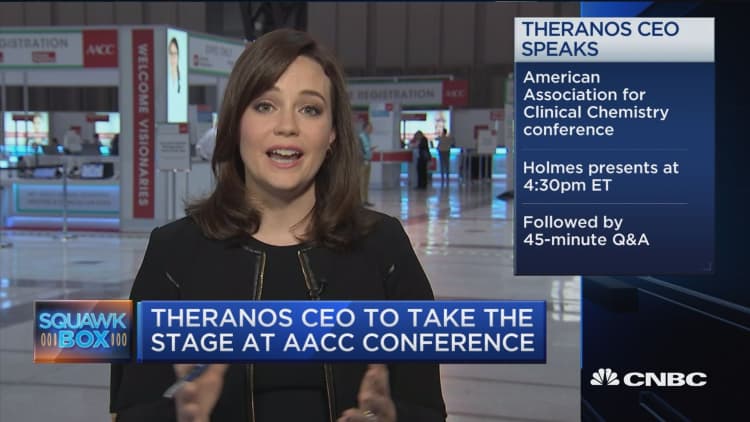

Theranos CEO Elizabeth Holmes outlined the steps she will take to increase transparency regarding the efficacy of the company's testing methods.
"There's been a lot of news about our company, and we chose this meeting today to begin engaging in a scientific exchange about our inventions and our technology," she said on Monday at the conference of the American Association for Clinical Chemistry.
"We fully understand in picking this place to come and introduce [the miniLab] that we have a lot of work to do to engage with this community and, I mean, I can tell you, I wish that I had started earlier in the context of building the scientific medical board that we've had the privilege to build. And now, working towards the peer-review publications, and that's not all going to happen in one day, in one presentation. It's going to happen over time," Holmes said.
Theranos was once a Silicon Valley darling with a $9 billion valuation. Now, experts are skeptical of the company and its "secretive" nature, pushing the company to publish data on its technology.
Holmes said that Theranos will partner with other institutions "to validate and publish our results." And Holmes' planned presentation includes research conducted under Institutional Review Board-approved protocols. The company also said it intends to submit its results to a publication for peer-review.
In theory, Theranos' early promise was simple but revolutionary: make testing possible on just a drop of blood where competitors require tubes of it to do so. But in practice, it's become increasingly unclear if Theranos has been able to accomplish it.
Holmes defended Theranos' mission, saying that the problem isn't over testing, but under testing. By collecting small-volume blood samples from asymptomatic people, Theranos aspired to detect diseases earlier by encouraging more frequent testing.
"The ability to engage in longitudinal testing actually means that you can redefine the normal range and have individualized normals as a way of looking at testing in the future, and we think that there's a lot of potential around that," she said.
Holmes said that a "wave of individuals engaging with health information is coming," and that it's a matter of setting "it up right, because the purpose is to help them engage with clinicians in the context of clinical care, and that's where these information systems come into play."
Holmes' presentation includes a slate of new products such as its miniLab, a robot that can process samples that normally require manual processing in traditional protocols. Theranos seems to be going back to the research and development drawing board, focusing on these new products instead of its much-debated small-volume blood collection technology.
Holmes emphasized that her presentation includes data about technologies that have not yet been approved by the FDA and are not currently for sale in the United States.
Holmes said that the miniLab was "invented consistent with our core design philosophy of minimizing the number of steps, especially pre-analytical steps, that have to be performed manually."
Theranos' miniLab is a self-contained laboratory that allows a robot to run a number of tests on samples. The miniLab contains different modules that allow it to conduct a series of tasks that traditionally would require multiple, separate machines.
Theranos used its miniLab to run its Zika nucleic acid-amplification-based assay using finger-prick samples the company collected, some in the Dominican Republic. The samples were shipped back to Palo Alto, California, for analysis.
Holmes said the results "demonstrate the miniLab's ability to perform automated, integrated molecular testing comparable to methods that require highly-trained personnel."
Theranos said it has submitted assay validation data for its Zika assay to the FDA for an Emergency Use Authorization.
For months, the company has found itself under scrutiny from federal regulators. Last month, the Centers for Medicare & Medicaid Services imposed sanctions, including a two-year ban for Holmes.
"Theranos is working closely with the Centers for Medicare & Medicaid Services to resolve the sanctions that the agency advised it plans to impose on the company's Newark, California, laboratory," the company said in a statement at the time, noting it has 60 days to appeal and was considering all its options.
Theranos has added two new executives to oversee regulatory, quality and compliance efforts, and recruited new scientific and medical advisory board members, including former CDC director Dr. William Foege.
— CNBC's Meg Tirrell contributed to this report.


